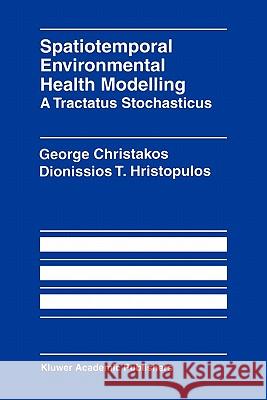Spatiotemporal Environmental Health Modelling: A Tractatus Stochasticus » książka
Spatiotemporal Environmental Health Modelling: A Tractatus Stochasticus
ISBN-13: 9781441950482 / Angielski / Miękka / 2010 / 400 str.
Spatiotemporal Environmental Health Modelling: A Tractatus Stochasticus provides a holistic, conceptual and quantitative framework for Environmental Health Modelling in space-time. The holistic framework integrates two aspects of Environmental Health Science that have been previously treated separately: the environmental aspect, which involves the natural processes that bring about human exposure to harmful substances; and the health aspect, which focuses on the interactions of these substances with the human body. Some of the fundamental issues addressed in this work include variability, scale, uncertainty, and space-time connectivity. These topics are important in the characterization of natural systems and health processes.
Spatiotemporal Environmental Health Modelling: A Tractatus Stochasticus explains why modern stochastics is the appropriate mechanical vehicle for addressing such issues in a rigorous way. In particular, modern stochastics incorporates concepts and methods from probability, classical statistics, geostatistics, statistical mechanics and field theory. The authors present a synthetic view of environmental health that embraces all of the various components and focuses on their mutual interactions.
Spatiotemporal Environmental Health Modeling: A Tractatus Stochasticus includes new material on Bayesian maximum entropy estimation techniques and space-time random field estimation methods. The authors show why these methods have clear advantages over the classical geostatistical estimation procedures and how they can be used to provide accurate space-time maps of environmental health processes. Also included are expositions of diagrammatic perturbation and renormalization group analysis, which have not been previously discussed within the context of Environmental Health. Finally, the authors present stochastic indicators that can be used for large-scale characterization of contamination and investigations of health effects at the microscopic level.
This book will be a useful reference to both researchers and practitioners of Environmental Health Sciences. It will appeal specifically to environmental engineers, geographers, geostatisticians, earth scientists, toxicologists, epidemiologists, pharmacologists, applied mathematicians, physicists and biologists.











